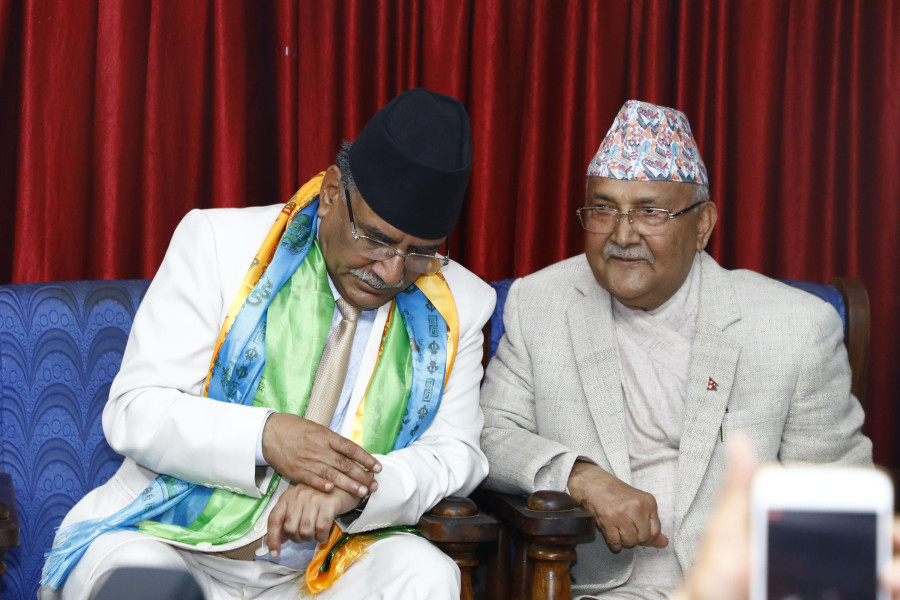Politics
As Oli, Dahal make light of media reports, a storm is brewing in ruling party
Party insiders say intense power play expected in the coming days
Tika R Pradhan
Over the past few days, the two co-chairs of the ruling Nepal Communist Party may have made light of an agreement on leading the government in turns, party insiders say all is not well within the party.
As per the agreement reached between KP Sharma Oli and Pushpa Kamal Dahal in May last year, just ahead of the unification of their parties Communist Party of Nepal (Maoist Centre) and the CPN-UML, the two leaders are to run the government for two-and-a-half years each.
Dahal, at least twice last week, discussed the agreement publicly—first with mediapersons in Biratnagar and then in an interview with Prime TV—stoking speculations in Kathmandu, just as Oli was in New Delhi.
Dahal said he believed the agreement would be upheld, as per which Oli should be handing over the reins to him after 15 months.
Oli did not wait until he returned home. He made a sarcastic remark while in Delhi: "There is not even a year left of my tenure; there are just four to five days."
He even went on to say that the agreement is a public document and that the issue had been blown up unnecessarily now, describing the turn of events as something which "shows the level of Nepali politics and its character".
Multiple leaders of the ruling party the Post spoke to, however, said the remarks from the two leaders are indicative of a growing trust deficit.
This whole back and forth between the two leaders also comes days ahead of a crucial meeting that will try to shape the party's departments, form the politburo, a crucial committee that deals with political issues, and finalise work division between the central committee members.
Amid all this, a debate over who should lead the party’s organisational department also hots up.
According to leaders, Dahal has been making a pitch for Bamdev Gautam, a former UML leader, while Oli is in favour of Ram Bahadur Thapa, a former Maoist leader and close ally to Dahal during the conflict, to lead the organisation department.
“Things are getting a bit serious,” a leader close to Dahal told the Post on condition of anonymity citing the sensitivity of the matter. “Concerns are growing among former Maoist leaders as they feel they are being sidelined.”
Dahal has led the government twice since his party signed the peace deal that ended the decade-long insurgency in 2006. But both the times he hardly governed for nine months.
His first stint ended a bit unceremoniously in 2008 following a row with the then Army chief.
He returned to power in 2016 for the second time, but only because Oli had betrayed him. Oli had apparently refused to uphold a gentleman’s agreement with Dahal, prompting him to side with the Nepali Congress to lead the government for nine months.
Many leaders from the former Maoist party believe Dahal is in an once-bitten-twice-shy situation and he is getting increasingly concerned about not getting a significant role in the unified party.
“Oli never offered Dahal to chair the meetings of party committees even though it’s part of the agreement,” said Haribol Gajurel, a standing committee member who represents the former Maoist party.
Even though calls are growing in the party for “one leader, one responsibility”, Oli has refused to pay heed and he continues to lead the government as well as the party. He has also been facing criticism from a section of ruling party leaders for leading on both fronts unilaterally.
This is why Dahal seems to be trying to make Gautam lead the organisation department.
Gautam, who has been vocal while criticising the party’s functioning, has been demanding that the party adopt “one leader, one responsibility”.
Gautam, who was a senior vice chairman in the erstwhile UML, has in the past been betrayed by Oli on more than one occasions. Gautam has publicly criticised Oli, saying the party chief had a hand in his defeat in the 2017 elections.
Gautam proposes that Dahal run the party and Dahal is proposing Gautam should head the organisation department.
Some leaders say the recent talks on the agreement on leading the government in turns are part of a bigger power play in the party.
A secretariat member told the Post last month that though Dahal would like to lead the government, he would not succeed until he managed to create an “intense pressure” on Oli. “It will be an obvious move if Dahal seeks support from those who would stand by him,” the leader had said.
As things stand today, it is Gautam whose statements go in favour of Dahal.
Asked about the ongoing conflict and power struggle in the party, Narayan Kaji Shrestha, the party spokesperson, admitted that the party needed to sort some important issues out. “But I don’t think a change in government leadership will emerge strongly in the upcoming meeting,” said Shrestha




 16.12°C Kathmandu
16.12°C Kathmandu














